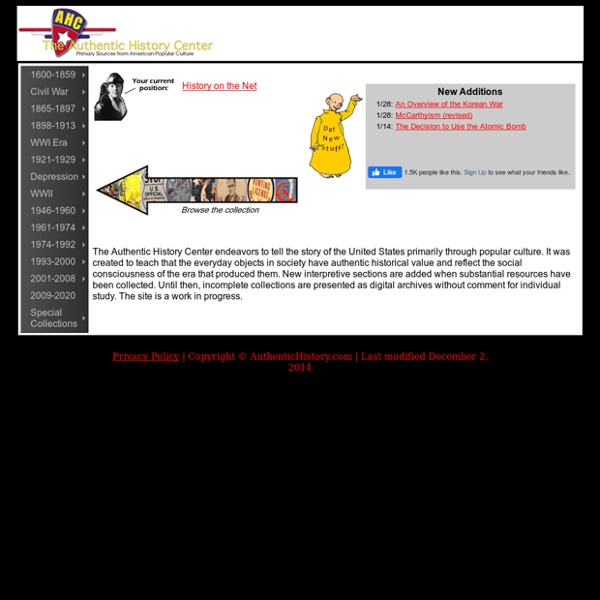



https://www.historyonthenet.com/authentichistory/
Related: US HistoryInternationalizing Student Learning Outcomes in History: A Report to the American Council on Education The task force presented its final report in September 2005 to a national gathering of higher education administrators in Washington, DC. Committee Members: Noralee Frankel (American Historical Association); Kevin Gaines (University of Michigan); John Gillis (Rutgers University); Dane Kennedy (George Washington University), Chair; Patrick Manning (Northeastern University), Sonya Michel (University of Maryland at College Park); Kevin Reilly (Raritan Community College); and Peter N. Stearns (George Mason University).
National Jukebox LOC.gov WARNING: Historical recordings may contain offensive language. Read the disclaimer Now Playing... Elk's reunion march Le parlate d'amor El teléfono a larga distancia At the jazz band ball Everybody's jazzin' it Pack up your troubles in your old kit bag and smile, smile, smile! View This Playlist 1919 Victrola Book of the Opera Etymologically Speaking... From the old Arabic word "hashshshin," which meant, "someone who is addicted to hash," that is, marijuana. Originally refered to a group of warriors who would smoke up before battle. Aaron White adds: You may want to explore the fact that the hashshshins were somewhat of a voodoo-ized grand conspiracy scapegoat cult (the very fact of their existence is impossible to confirm). They supposedly were a secret society (a la the FreeMasons) which was influential in every middle eastern court from Persia to Bangladesh. They were supposedly a brotherhood of assasins, devoted to their caballa and its secrecy, protected by an unlimited number of fanatical followers and unlimited material wealth. Assassination was their favorite method of instituting their power (see the Zoroastrian lore of the eunich priest Arachmenes and his assistance to Darius and Xerxes in their rise to/fall from power).
Appraising the Electoral College - Bill of Rights Institute Every four years Americans head to the polls to select the presidential candidate they like best. Most people think their vote is a direct link to the candidate of their choice – but things aren’t quite that simple. In reality, individuals vote for an elector who has pledged to vote for a particular candidate. After the main election, these electors convene and cast their votes to determine who will become the next president. The Electoral College has many quirks and complexities than can be difficult to explain, and it can create a few problems from time to time. One of the main problems is that presidential candidates don’t have to win the popular vote in order to win the electoral vote and therefore the presidency.
Welcome to Chandoo.org - A short introduction to our site Thank you so much for taking time to visit us. Over the last few weeks, we have quite a few new members to the site. Its good time I said hello and introduced this site to you. What is Chandoo.org? At Chandoo.org, our goal is simple. The Contested History of American Freedom No idea is more fundamental to Americans' sense of ourselves as individuals and as a nation than freedom. The central term in our political vocabulary, freedom—or liberty, with which it is almost always used interchangeably—is deeply embedded in the record of our history and the language of everyday life. The Declaration of Independence lists liberty among mankind's inalienable rights; the Constitution announces securing liberty's blessings as its purpose.
The American Revolution - Lesson Plan Advisor: Timothy H. Breen, William Smith Mason Professor of American History, Northwestern University , National Humanities Center Fellow.Copyright National Humanities Center, 2011 How was the American Revolution a civil war that turned neighbors into enemies? Understanding 12 Amazing Vietnam War Teaching Resources From PBS LearningMedia The Vietnam War is one of the most significant events in American history. What really happened? Why did things go wrong? We put together this list of our favorite Vietnam War teaching resources, including new materials from THE VIETNAM WAR: A FILM BY KEN BURNS AND LYNN NOVICK, from PBS LearningMedia’s Teaching the Vietnam War Collection. These videos, lesson plans and discussion guides will help you navigate controversial topics and emotionally-charged questions while teaching your students important life lessons through American history. 1.
Walker's Appeal - The David Walker Memorial Project In 1829, David Walker wrote David Walker’s Appeal to the Colored Citizens of the World. Many historians now regard the Appeal as one of the most important social and political documents of the 19th century. Nothing like it had been published before.